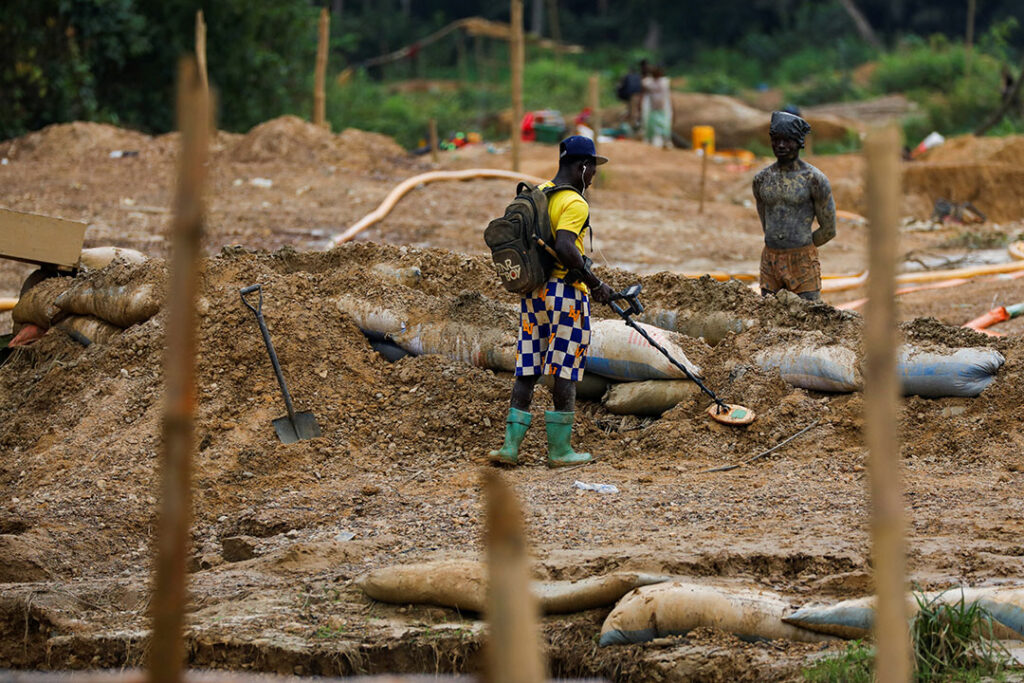Practitioners of galamsey, Ghana’s illegal small-scale mining epidemic, once used picks and shovels to extract gold and other minerals from the earth, but the industry is evolving and growing more violent.
According to Ghanaian newspaper The Daily Graphic, some illegal miners now are allied with transnational crime networks, which helps them procure military-grade weapons, such as AK-47 rifles and drones, and excavators, industrial equipment and encrypted communication systems.
Many illegal miners now operate out of fortified camps with trenches, watchtowers and armed patrols, turning galamsey into a more lethal vocation. Between 2020 and 2023, clashes with armed galamsey groups killed more than 50 security personnel and 120 civilians, according to Human Rights Watch.
In 2022, security forces confiscated about 1,500 illegal firearms, including submachine guns and grenades, from galamsey sites in the Ashanti and Western regions, The Daily Graphic reported. The scourge has inspired frequent protests.
Ghanaian President John Mahama said when he was vying for the presidency last year, he did not think he could quickly solve the complex issue that threatens national security and environmental sustainability.
“It’s a very complex fight,” Mahama said in a report on Ghana’s Ministry of Lands and Natural Resources’ website. Due to a lack of economic opportunities, many of Ghana’s unskilled young people are engaging in small- and medium-scale galamsey mining as an easy way to earn money without regard for the long-term effects to the country’s economy and environment.
Shoot to Kill
Janet Nablah, national chairwoman of Ghana’s People’s National Party, is among those who support a shoot-to-kill policy, arguing that illegal miners are murderers who need to be eliminated. “Illegal miners are fearless and engaging in galamsey in unprecedented ways,” Nablah said on Ghana’s Rainbow Radio 87.5 FM.
According to The Daily Graphic, Ghana’s legal system provides robust grounds for a shoot-to-kill policy as a last-resort measure to combat galamsey. The United Nations Basic Principles on the Use of Force says lethal force is permissible when it is “strictly unavoidable to protect life.”
There also is precedence in Africa for using such a model. In 2016, Kenya implemented a shoot-to-kill order against ivory poachers that reduced elephant deaths by 80%, The Daily Graphic reported.
Ecosystem Collapse Possible
Galamsey annihilates ecosystems that sustain Ghana’s biodiversity and livelihoods. The use of mercury and heavy metals has contaminated more than 60% of the country’s water sources, according to Ghana’s Water Resources Commission. The charity WaterAid calls galamsey’s effects on Ghana’s environment “ecocide.”
The Pra River, which supports nearly 5 million people, now is 30 times cloudier than World Health Organization standards due to silt from galamsey. Fish populations in Lake Bosomtwe have declined by 70%, threatening food security, The Daily Graphic reported. Cyanide and other toxic chemicals used in galamsey have turned the Ankobra and Offin rivers into hazard zones, depriving about 4 million Ghanaians of safe drinking water.
Forests that once spanned 8.2 million hectares have been reduced to 5.8 million, with galamsey responsible for almost 60% of this loss. The scourge also has obliterated farming communities, fueling food insecurity in regions such as Amansie West, where cassava yields plummeted by 40% in 2022, according to The Daily Graphic. If it goes unchecked, galamsey will render Ghana’s ecosystem and agricultural production irrecoverable by 2030.
Mahama’s administration has taken several steps to address the menace. It banned the Community Mining Scheme, which was implemented in 2023 to formalize illegal mining in selected communities across the country and divert young people from illegal mining to properly regulated mining. Critics said the initiative failed.
Mahama has warned government officials not to engage in any form of the mining industry, and his administration formed a technical committee to review problematic mining licenses. As of late March, 55 such licenses had been revoked. The government also launched the Tree for Life and Blue Water initiatives to restore forests and protect water bodies.
“While these measures are commendable, more needs to be done,” environmental researcher John-Baptist Naah wrote for Modern Ghana. “Declaring a state of emergency and maintaining political will are crucial to winning this fight.”

